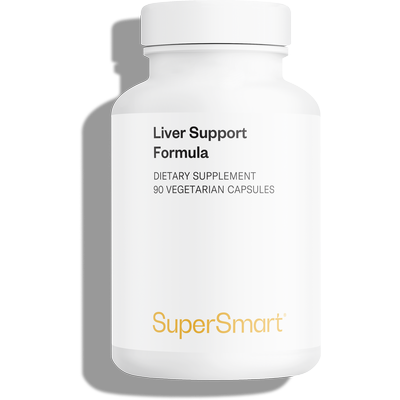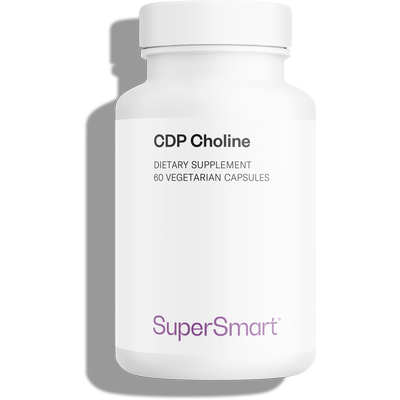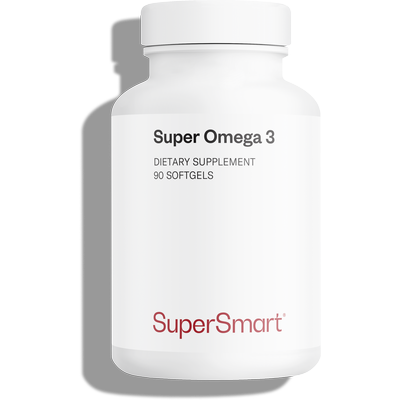A totally new combination for preventing Alzheimer’s disease and cognitive decline
 In December 2018, we published an article entitled “Get rid of the jelly invading your brain” which demonstrated the importance of omega-3 fatty acids for maintaining the health of your brain and optimising your cognitive function as you grow older.
In December 2018, we published an article entitled “Get rid of the jelly invading your brain” which demonstrated the importance of omega-3 fatty acids for maintaining the health of your brain and optimising your cognitive function as you grow older.
This article discussed several key points:
- The body uses omega-3 from the diet to produce specific fats (phospholipids).
- These fats are incorporated into cell membranes, especially in the brain, making the membranes less rigid and more fluid.
- Membrane fluidity is essential for healthy nervous communication: it optimises transmission of information from one neuron to another (in a process called synaptic transmission).
- As a result of recent changes in our eating habits (decreased consumption of nuts and fish, and dramatically-higher consumption of omega-6 fatty acids), our cell membranes are increasingly lacking in omega-3 and becoming more and more rigid.
- This rigidity accelerates cognitive decline by disrupting the continuity of nervous communication.
- Supplementation results in omega-3 fatty acids being gradually taken up by cell membranes, thus restoring membrane fluidity within just a few months.
The results of a new study presented at a recent conference show that there is not always optimal incorporation of omega-3 into cell membranes. In certain people, one of the steps in the process - production of the specific fats containing omega-3 - does not take place as it should and it seems these individuals are at higher risk of Alzheimer’s disease. In fact, omega-3 fatty acids do not ‘embed’ directly in cell membranes: they first have to be gathered together with other elements to form phospholipids, the fats which are able to penetrate membranes. And this ‘assembly’ takes place in the liver.
The University of Pennsylvania researchers behind the study showed that in individuals with mild cognitive deficiency or memory problems or who were in the early stages of Alzheimer’s disease, production of some of these phospholipids was defective (notably plasmalogens which are essential for healthy nerve tissue function). What normally happens is that these fats (which contain the precious omega-3) leave the liver to travel to the brain via the blood vessels. But in the above-mentioned cases, the researchers observed unusually low circulating levels of these fats, indicating impaired production in the liver.
According to one of the study’s authors, this decline in production is likely to be age-related: ”as the body ages, the liver can no longer produce enough“. But ageing can be influenced by a number of factors! Conditions such as diabetes and obesity mean the liver has to work harder in order to metabolise fatty acids, which leads to premature ‘fatigue’. In addition, some people are likely to be genetically predisposed to more rapid changes in lipid metabolism in the liver, and these genes are associated with Alzheimer’s disease. In such individuals supplementing with omega-3 is less effective as the liver is unable to use all the precious resources available to it and a proportion of the ingested omega-3 fatty acids never reaches the brain.
These results and their implications open up a totally new field of research in terms of developing nutritional approaches to preventing Alzheimer’s disease and cognitive decline in general. While still supportive of the idea of supplementing with omega-3 (DHA could halve the risk of Alzheimer’s as a result of the renewal of biological membranes (1-2)), they suggest that omega-3 supplementation should be combined with measures aimed at supporting liver function.
There are currently three dietary supplements of particular interest for optimising liver health:
- Milk thistle extract (also known as wild artichoke) standardised in silymarin, a molecule with exceptional antioxidant and liver-protective properties.
- Picrorhiza kurroa extract standardised in kutkin, which stimulates liver regeneration. These two extracts are combined with other liver-beneficial substances in the highly-regarded supplement Liver Support Formula.
- Choline, an essential nutrient often grouped with the vitamin B complex, which offers exceptional liver-protective properties as well as support for cognitive function. A perfect substance for delivering the benefits identified by the very latest research findings and one which is officially recognised by the EFSA for optimising liver function …
These three natural ingredients thus offer highly-promising ways of supporting liver health, and by extension, boosting cognitive function.
The suggested dose for this combination (to be taken for at least 3 months) is:
2-4 capsules a day of CDP Choline 250 mg.
3 softgels a day of Super Omega-3 at mealtimes.
For those with more risk factors, 3 additional capsules a day of Liver Support Formula.
The study at the centre of this article:
Alzheimer's Association International Conference® 2018 24-Jul-2018 Alzheimer's disease risk impacted by the liver, diet
Other references
- S. C. Cunnane, M. Plourde, F. Pifferi et M. Bégin, « Fish, docosahexaenoic acid and Alzheimer's disease », Progress in Lipid Research, vol. 48, 1er septembre 2009, p. 239–256
- Martha Clare Morris, Denis A. Evans, Julia L. Bienias et Christine C. Tangney, « Consumption of fish and n-3 fatty acids and risk of incident Alzheimer disease », Archives of Neurology, vol. 60, 1er juillet 2003, p. 940–946

A reference formula that brings together the best natural ingredients for liver health
www.supersmart.comAll rights reserved
Free
Thank you for visiting our site. Before you go
REGISTER WITHClub SuperSmart
of exclusive benefits:
- Free: our weekly science-based newsletter "Nutranews"
- Special offers for club members only
















